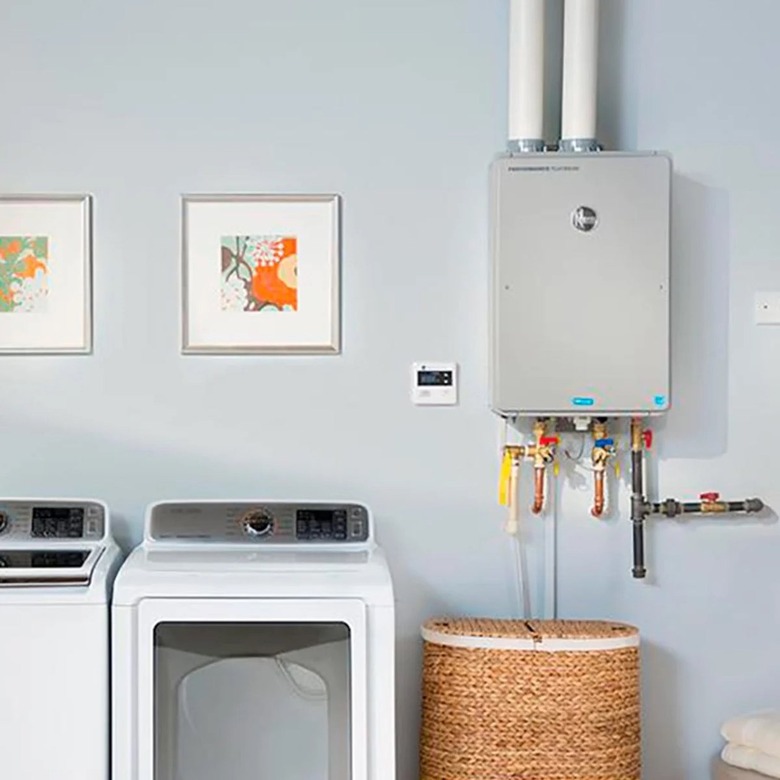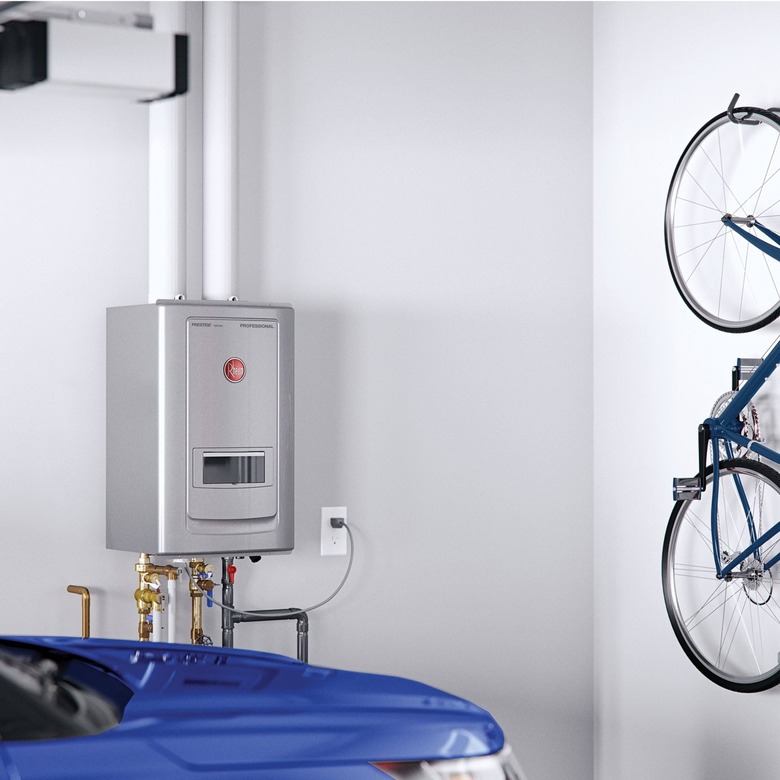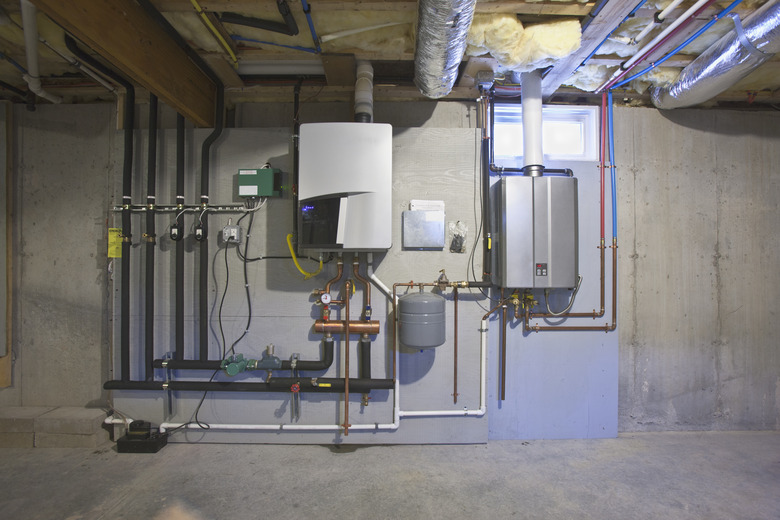Tankless Water Heater Cost And Installation Basics
We may receive a commission on purchases made from links.
When it's time for a new water heater, homeowners should consider replacing their old appliance with a tankless water heater. On average, 40 to 50 percent of the natural gas burned by a water heater with a tank is wasted, and electric units don't fare much better and can account for up to 17 percent of your home's total energy usage.
This happens because it must continually expend energy to heat water in the tank so that it's always ready when you need it. Unfortunately, this means running the water heater even when you're not using any water, which amounts to about three to five hours of run time every day. A tankless water heater, on the other hand, runs only when you need it and may be able to reduce your energy bills.
Ready to see what all the buzz is about tankless water heaters? Here's a breakdown of what they cost and how they're installed.
Tankless Water Heater Costs
Tankless Water Heater Costs
On average, the cost to install a new tankless water heater ranges from about $1,200 to $3,375. The average is around $2,271, but many factors determine the cost of an installation. One factor is, of course, the going labor rate where you live. Don't plan on doing a DIY installation to try to reduce the cost, however. Installing a tankless water heater is definitely not a do-it-yourself proposition and is best left to a plumber or an electrician.
The type of heater you choose will also impact the price you pay. Electric tankless units are cheaper and run about $500 to $1,500 installed. The specifics of your installation will also affect the price. You may, for example, need an electrician to add new electrical service near the heater to supply power. They may also have to add a new circuit breaker to your box. These jobs add to the cost of your project.
The same is true for gas tankless water heaters. The heater and installation cost between $1,000 and $1,500, but that's only if you have the right setup to begin with. Gas units must vent outside, which usually requires installing a new vent. Patching into an existing vent system is rarely possible, and so it costs extra to run gas lines as well if you don't already have them where you need them.
Tankless Water Heater Installation
Tankless Water Heater Installation
Installing a tankless water heater is tricky and involves safely blending electricity, water, and sometimes gas. All three of these services can cause problems when not properly installed or if leaks let them go where they shouldn't. This makes installation best left to the pros.
The first step is removing your old water heater. The pro installing the appliance will need to disconnect the electricity, plumbing, and gas first and then drain the water heater's tank. Even if they are putting your new water heater in the same area, installation won't be plug and play. They may need to install a designated gas line rather than using the old one, and could need more electricity to fire up the unit. Any water, electrical, or gas lines you won't be using any longer need to be safely capped and sealed.
Gas Water Heater Installation
When installing a tankless gas water heater, your pro will need to vent the unit directly outside. These units won't vent through a masonry chimney, and you usually can't just patch them into an existing ventilation system. A gas tankless water heater may also require a gas line upgrade, even if your old water heater ran on gas. If you live in a warm area, you can also mount a tankless gas water heater on the outside of your home for easy ventilation.
A tankless water heater uses less gas overall but needs more immediately when the system first fires up. Your existing gas line might be too small to accommodate this need and may require an upgrade. Installing a gas unit involves running the gas line, venting the unit, and patching it into your water system. Gas units use gas to heat the water but still require nearby electricity to run.
Electric Tankless Water Heater Installation
Electric tankless water heater installation is equally complex. Although ventilation isn't an issue, drawing electrical power is. You need to have electrical power nearby that can provide 28,000 watts of power. That kind of draw may necessitate two or even three circuit breakers, and you may not have room in your current electrical box to accommodate them, forcing you to upgrade your electrical panel. Once you've provided adequate power, you'll need to hook up supply lines to get water into the heater and add plumbing to send the hot water throughout the house.
Whether you choose a gas or electric model, you'll need to consider local building codes. Many places, for example, have strict rules about how close the vent on a gas appliance can be to windows and doors. If you fail to follow code rules, you could be forced to make costly alterations or remove your tankless water heater altogether.
Will I Use Less Energy?
Will I Use Less Energy?
In a word, yes. Tankless water heaters provide hot water on demand rather than filling a water tank and holding it there. This means that you're only using energy to heat your water when you're actively using it (therefore having a more energy efficient appliance). Tankless water heaters use 27 to 50 percent less energy than units that utilize a tank. Depending on how much water you use, it costs $75 to $300 a year to run an electric tankless water heater and $175 to $500 per year for gas.
Although you can expect a tankless water heater to lower your energy costs and save money over time, they admittedly cost more to install than a traditional tank-style water heater. Your individual usage and energy prices will vary, but tankless water heaters tend to pay for themselves over time, and they have a lifespan of up to 20 years. The upfront price may sting a bit, but tankless water heaters are an excellent value over time.
Time will also impact your energy costs a bit. The further south you go in the United States, the warmer the groundwater gets. It takes less energy to heat groundwater that starts at 70 degrees Fahrenheit than it does to warm water that starts at 42 degrees. Warmer water allows your water heater to deliver hot water at a higher flow rate, minimizing the amount of time you must run the water and therefore the heater.
Gas Versus Electric Units
Gas Versus Electric Units
In most areas, gas costs less than electricity, which means a gas water heater will cost less to run. Gas may require a larger investment initially, though, since you might need to upgrade your gas line during installation. Gas also requires exterior venting that follows strict guidelines. Gas units, however, tend to last about 20 years. Electric units are simpler and can last even longer.
Electric units may cost a bit more to operate, but they're much easier to install. Because you need not vent them to the outside, you can tuck them into closets, crawl spaces, attics, and other out of the way areas much more easily. You can pretty much mount them anywhere that you can get electricity and water. They're also about a third of the size of gas units, so they'll take up less space no matter where you put them.
Gas systems are generally capable of delivering more gallons of water per minute than their electric cousins. This can make them a better choice for large households with higher water demand, but flow rates aren't always quite so simple. A gas unit may have the ability to deliver more hot water, but both gas and electric will deliver less than their maximum rates in areas where the groundwater is colder.
Both types of water heaters work best when inspected and maintained periodically by a professional. Gas systems, however, generally require a bit more maintenance. Both use water filters that need changing at least once a year, and both benefit from annual flushing. Flushing is the process of running water and a cleanser through the unit to remove scale buildup. Gas units benefit from more frequent flushing because they're more sensitive to lime buildup. They typically need three flushings per year.
Pros and Cons
Pros and Cons
Like traditional units, tankless water heaters have their pros and cons. One benefit is that tankless water heaters are smaller and can be creatively mounted. You don't have to lose any floor space to a tankless unit. Tankless units also create a bit less potential for making a mess. Any plumbing in your house can leak, but a full water heater tank can be a bigger mess. If the holding tank cracks or ruptures, the water already in the tank can empty itself onto the floor quite quickly, easily spilling 30 to 50 gallons of water at a time.
Tankless water heaters also make sure you never run out of hot water. They keep heating the water as long as you need it so you never need to worry about emptying the tank. Your daughter can fill the bathtub with steaming hot water, and you'll still have hot water to do the dishes. Winterizing tankless units is also easier. If you close down your vacation home for the winter, it takes much less time to winterize a tankless unit than it does to empty a big hot water tank.
Tankless water heaters are sensitive to low flow problems, however. Lime and scale buildup in a tankless heater reduces water flow through the heater significantly more than it affects a traditional water heater. Lime and scale often settle to the bottom of the water heater tank where they cause less harm. A tankless water heater, however, needs flushing much more often to remove hard water deposits. You'll need to make an effort to keep things clean, especially if you have hard water.
Tankless units do have their limits as well. You don't have to worry about emptying the tank, but you may need a larger and more powerful unit to service a busy household. If you underestimated your hot water needs, you can replace your current unit with a bigger one or add a second unit to the home.
Be aware that a power outage is an instant end to your hot water. An electric unit with a tank holds enough water that you may still have some hot water for a time if the power goes out. If your current heater runs on gas alone, a power outage won't be an issue. A tankless water heater lacks this reserve, however, and even gas heaters need electricity if they're tankless. This means a power outage is game over for your hot water supply. This isn't usually a grave concern for most people, but it is worth noting if you live in an area where power outages are frequent.
References
- HomeAdvisor: How Much Does It Cost To Install A Tankless Water Heater?
- PickHVAC: How Much Does a Tankless Water Heater Cost with Installation in 2021
- The Home Depot: How to Install a Tankless Gas Water Heater
- Water Heater Leaking Info: Gas vs. Electric Tankless Water Heater: Which is Best?
- Forbes Advisor: Learn The Major Pros And Cons Of A Tankless Water Heater
- Direct Energy: How Much Energy Does My Water Heater Use?


